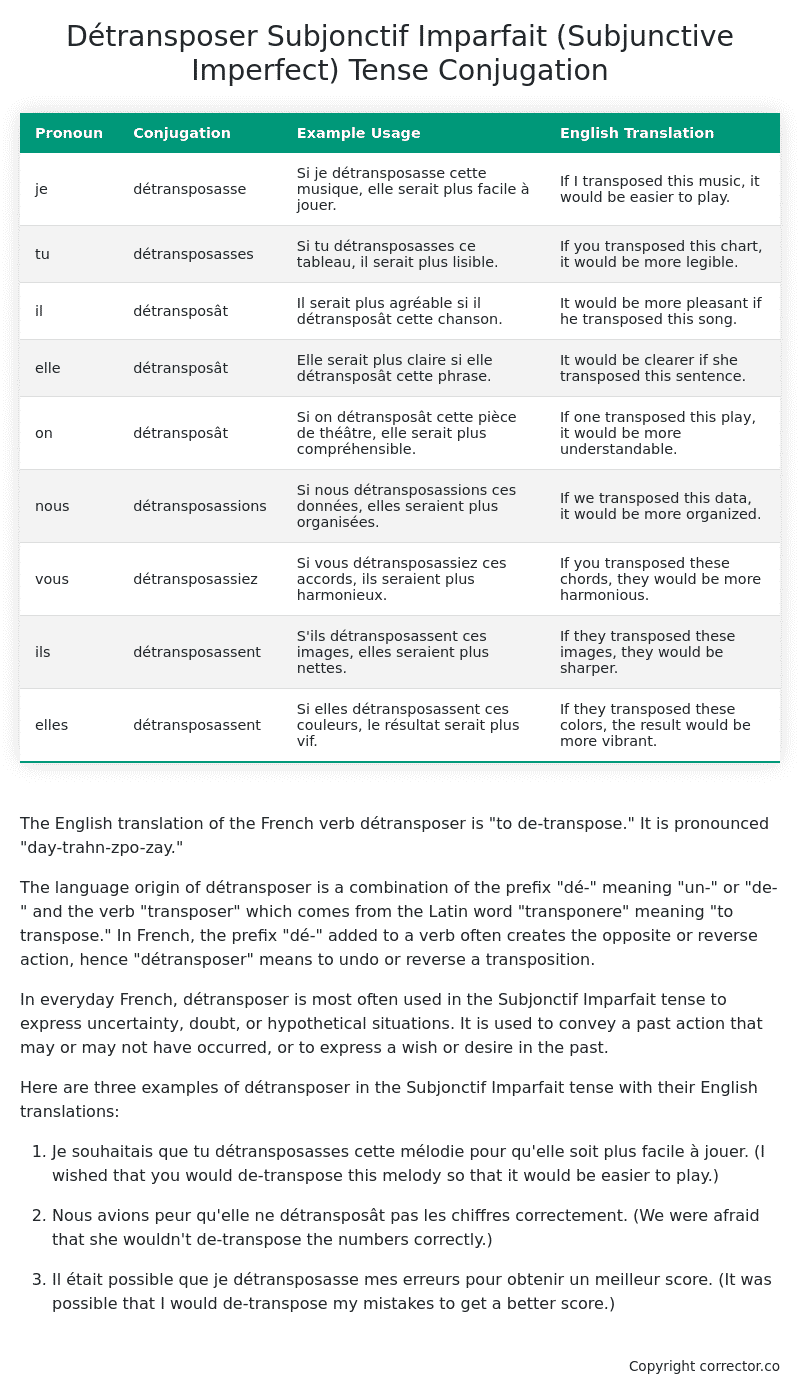Subjonctif Imparfait (Subjunctive Imperfect) Tense Conjugation of the French Verb détransposer
Introduction to the verb détransposer
The English translation of the French verb détransposer is “to de-transpose.” It is pronounced “day-trahn-zpo-zay.”
The language origin of détransposer is a combination of the prefix “dé-” meaning “un-” or “de-” and the verb “transposer” which comes from the Latin word “transponere” meaning “to transpose.” In French, the prefix “dé-” added to a verb often creates the opposite or reverse action, hence “détransposer” means to undo or reverse a transposition.
In everyday French, détransposer is most often used in the Subjonctif Imparfait tense to express uncertainty, doubt, or hypothetical situations. It is used to convey a past action that may or may not have occurred, or to express a wish or desire in the past.
Here are three examples of détransposer in the Subjonctif Imparfait tense with their English translations:
-
Je souhaitais que tu détransposasses cette mélodie pour qu’elle soit plus facile à jouer. (I wished that you would de-transpose this melody so that it would be easier to play.)
-
Nous avions peur qu’elle ne détransposât pas les chiffres correctement. (We were afraid that she wouldn’t de-transpose the numbers correctly.)
-
Il était possible que je détransposasse mes erreurs pour obtenir un meilleur score. (It was possible that I would de-transpose my mistakes to get a better score.)
Table of the Subjonctif Imparfait (Subjunctive Imperfect) Tense Conjugation of détransposer
| Pronoun | Conjugation | Example Usage | English Translation |
|---|---|---|---|
| je | détransposasse | Si je détransposasse cette musique, elle serait plus facile à jouer. | If I transposed this music, it would be easier to play. |
| tu | détransposasses | Si tu détransposasses ce tableau, il serait plus lisible. | If you transposed this chart, it would be more legible. |
| il | détransposât | Il serait plus agréable si il détransposât cette chanson. | It would be more pleasant if he transposed this song. |
| elle | détransposât | Elle serait plus claire si elle détransposât cette phrase. | It would be clearer if she transposed this sentence. |
| on | détransposât | Si on détransposât cette pièce de théâtre, elle serait plus compréhensible. | If one transposed this play, it would be more understandable. |
| nous | détransposassions | Si nous détransposassions ces données, elles seraient plus organisées. | If we transposed this data, it would be more organized. |
| vous | détransposassiez | Si vous détransposassiez ces accords, ils seraient plus harmonieux. | If you transposed these chords, they would be more harmonious. |
| ils | détransposassent | S’ils détransposassent ces images, elles seraient plus nettes. | If they transposed these images, they would be sharper. |
| elles | détransposassent | Si elles détransposassent ces couleurs, le résultat serait plus vif. | If they transposed these colors, the result would be more vibrant. |
Other Conjugations for Détransposer.
Le Present (Present Tense) Conjugation of the French Verb détransposer
Imparfait (Imperfect) Tense Conjugation of the French Verb détransposer
Passé Simple (Simple Past) Tense Conjugation of the French Verb détransposer
Passé Composé (Present Perfect) Tense Conjugation of the French Verb détransposer
Futur Simple (Simple Future) Tense Conjugation of the French Verb détransposer
Futur Proche (Near Future) Tense Conjugation of the French Verb détransposer
Plus-que-parfait (Pluperfect) Tense Conjugation of the French Verb détransposer
Passé Antérieur (Past Anterior) Tense Conjugation of the French Verb détransposer
Futur Antérieur (Future Anterior) Tense Conjugation of the French Verb détransposer
Subjonctif Présent (Subjunctive Present) Tense Conjugation of the French Verb détransposer
Subjonctif Passé (Subjunctive Past) Tense Conjugation of the French Verb détransposer
Subjonctif Imparfait (Subjunctive Imperfect) Tense Conjugation of the French Verb détransposer (this article)
Conditionnel Présent (Conditional Present) Tense Conjugation of the French Verb détransposer
Conditionnel Passé (Conditional Past) Tense Conjugation of the French Verb détransposer
L’impératif Présent (Imperative Present) Tense Conjugation of the French Verb détransposer
L’infinitif Présent (Infinitive Present) Tense Conjugation of the French Verb détransposer
Struggling with French verbs or the language in general? Why not use our free French Grammar Checker – no registration required!
Get a FREE Download Study Sheet of this Conjugation 🔥
Simply right click the image below, click “save image” and get your free reference for the détransposer Subjonctif Imparfait tense conjugation!

Détransposer – About the French Subjonctif Imparfait (Subjunctive Imperfect) Tense
Formation
Common Everyday Usage Patterns
Interactions with Other Tenses
Subjonctif Présent
Indicatif Passé Composé
Conditional
Conditional Perfect
Summary
I hope you enjoyed this article on the verb détransposer. Still in a learning mood? Check out another TOTALLY random French verb conjugation!


